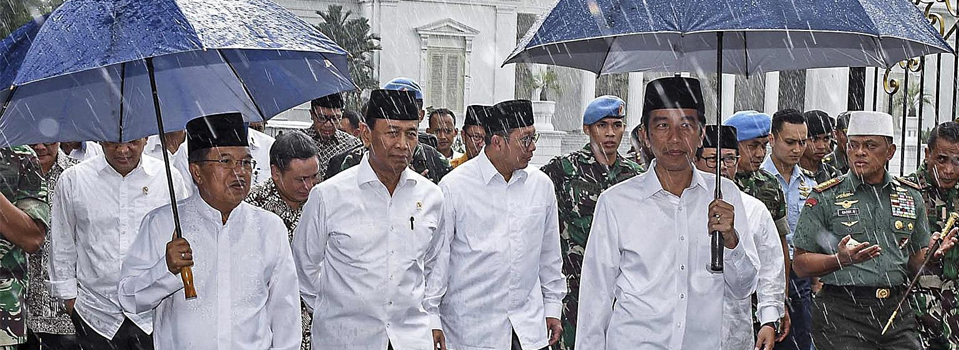Some in the party want him censured for meeting Laskar Jihad leader, while others urge restraint fearing new turmoil.
President Megawati Sukarnoputri’s Indonesian Democratic Party-Struggle (PDI-P) is divided over how to deal with her errant deputy, with some members calling for Mr Hamzah Haz to be summoned to the palace for an explanation.
But others are urging restraint, warning that open confrontation with the Muslim leader with strong grassroots links could sink Indonesia into another political crisis.
The hardliners, led by Ms Megawati’s husband Taufik Kiemas, made clear their feelings at a party meeting on Tuesday.PDI-P insiders said that they wanted the 54-year-old leader to hold her Vice-President accountable for his open courtship of Muslim militants which included his meeting Laskar Jihad leader Jafaar Umar Thalib who has been detained for stirring up violence in Maluku islands.
They were seeking an official explanation from Mr Hamzah and expected the palace to censure him for his actions. Some in the faction even wanted Ms Megawati to come up with a specific job description ‘to keep him occupied everyday’.
Said a PDI-P legislator: ‘By not doing anything, Ibu Mega is being perceived at home and abroad as being weak and not in control of the situation. We cannot let the No 2 set the agenda.’
The more pronounced view, however, was to try and cool down political temperatures. Those subscribing to this view included conservatives like Mr Theo Syafei and Mr Gunawam Wirosarodjo who, sources said, appear to have the President’s ear on this issue.
There were two reasons why Ms Megawati and the moderates did not want to go for the jugular.
For one, she wanted her administration to remain united until 2004. Taking Mr Hamzah head on risked tearing apart the government and could percolate downwards to grassroots levels, pitting PDI-P supporters against Muslim groups.
‘We are trying to play things down because we don’t want any violence,’ said a PDI-P source.
‘We also do not want a third party like Golkar to become the chief beneficiary in this squabble.’
A related consideration was that by taking a hardline stance against Mr Hamzah, it could alienate the wider Muslim community in Indonesia that could damage severely the PDI-P’s chances of winning their votes in the 2004 election.
Ms Megawati and the PDI-P’s standing was not helped given perceptions that it was warming to the armed forces (TNI) and could launch a Suharto-style crackdown on Islamic elements in the country.
Even though Mr Hamzah’s Muslim-based United Development Party is split, it would come together – with perhaps even moderate elements from the Nadhlatul Ulama where the Vice-President is one of its elders – to challenge secular nationalist parties like the PDI-P.
The political strategy now was to lie low.
But the moderates were preparing to slug it out against Mr Hamzah by cultivating the Muslim ground as well.
PDI-P sources said that Ms Megawati’s aim was to go on the offensive in the run-up to the election by also courting several of the Muslim groups, both moderate and militant.
Hamzah problem
Ms Megawati wants her administration to remain united until 2004. Taking Mr Hamzah head on risked tearing apart the government.
Also, taking a hardline stance against him could alienate the wider Muslim community and damage the chances of winning their votes in the 2004 elections.

